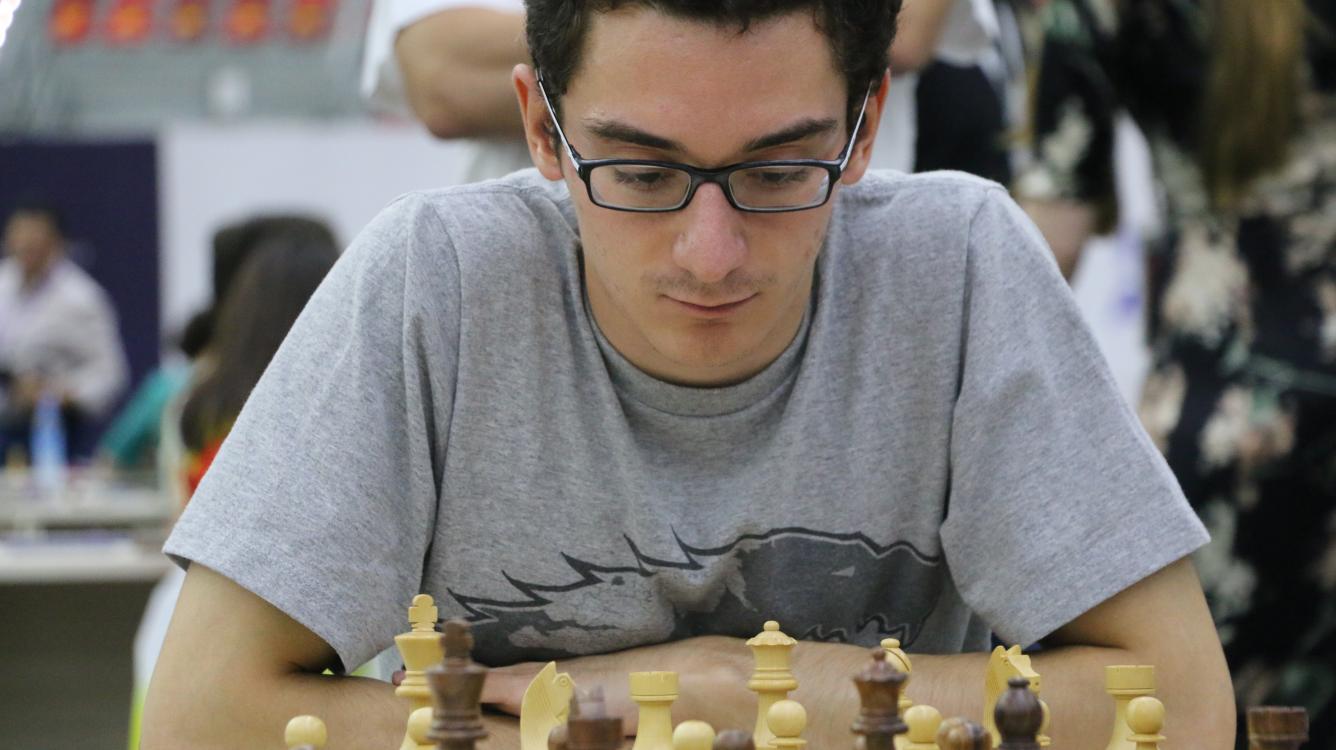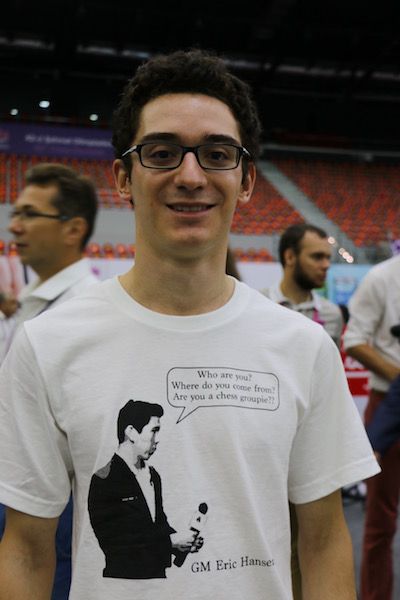
Fabiano Makes Forbes; Newspaper Editor Blunders
"In Other News" has been on a little bit of a hiatus, which means this column is overflowing with chess tidbits to share. Today we have a world elite gracing a business magazine's "top" list, while a newspaper doesn't fact check that two elite sisters share the same last name. In between there's a chess-crazed town, American football, and sadly some chess deaths to note.
Sure, "Forbes" magazine produced no less than twenty "30 Under 30" lists for young professionals, but it's still nice to be included, right? GM Fabiano Caruana made the list under the category "Games."
I feel honored and privileged to appear in Forbes' 2017 list of "30 Under 30 In Games!" https://t.co/sLzRx8blAm #30Under30
— Fabiano Caruana (@FabianoCaruana) January 3, 2017
What's notable is the company he keeps. The other nominees were almost exclusively developers of e-gaming platforms, not competitors. Amidst "developers," "founders," "designers," and "managers," Caruana was one of the very few to actually master playing a game.
Click around to the other profiles and you'll see many who own companies or e-sports franchises embracing the words "geek" or "nerd." Instead, modern top grandmasters usual seek to distance themselves from such designations.

GM Fabiano Caruana, relaxed just before winning a gold medal last year. He's the only Forbes-honored ChessBrah that we know of.
That's among many of the strange chess customs that have been practiced in the small German hamlet of Ströbeck. Despite a declining population, the game plays an inextricable role in the local fabric of the 1,000 or so residents.

Human chess played in Ströbeck in 1932. (Photo: Wikipedia.)
Chess was introduced a little more than one millennium ago, and in all that time, the locals have altered the rules in very strange ways.
If a local Ströbeck player was about to fall victim to a tactic, friendly townsfolk would warn in their local dialect. Before getting married to a resident, a love interest had to beat the mayor in a game (the last to attempt this, in 2011, lost and instead donated €70 to the local chess club) . In addition, the village altered the rules into a variant dubbed "courier chess."

Is it me or do the kings on e1 and f1 look like the starting and ending punctuation in a Spanish sentence? You're going to have to learn the rules yourself. (Graphic: Wikipedia)
Chess has infused itself in modern culture too. There's a chess museum, currency of the 1920s with chess themes, and the town teaches chess in the curriculum at its lone elementary school. What's it called? "Emanuel Lasker," of course.
For this important story about skipping the women's world championship, you'd think it would be easy to source an accurate picture of former title-holder GM Maria Muzychuk. Especially so if you are a site focusing on Ukrainian interests.
But this is what happens when you only google the last name of your subject:
While GM Mariya Muzychuk decided Iran wasn't suitable for the tournament, her sister GM Anna Muzychuk (pictured!) did attend, and is in the semifinals at the time of this writing.
More than one month after the news story was released, the wrong picture remains. That'll make things easy to find a file photo in case Anna wins the tournament!
Women Underperform When Playing Men?
This meta-analysis of several different studies attempts to show, using statistical evidence, that female chess players don't play as well when facing men. (Before you ask, the author is a female professor.)
Using data derived from move accuracy analysis of elite chess players, a recent study by three economists and two computer scientists determined that a woman's performance is reduced about 30 Elo points when playing men. The means that if a woman and man of equal rating play, instead of having a 50 percent expected chance, she is reduced to 46 percent.
The researchers also found male behavior changes too -- men are much more likely to prolong lost positions and defer resignation when playing against women.
Two decent chess players also happen to mash their heads on Sundays playing professional American football. Both were featured in wholly different segments recently.
First up was Pittsburgh Steelers running back Le'Veon Bell, who claimed he once played he played in his state championship as a kid. By trading in his helmet for a Kangol, Bell enters the Pittsburgh Chess Club undercover. This is what happens:
DraftKings dubs Bell a "chess expert" but there's no record of him in the U.S. Chess ratings database.
Next up is the oversized brain, and head, of Baltimore Ravens offensive lineman John Urschel (who has graced Chess.com/TV before). Make sure you watch all the way to see a cameo by a frequent contributor to Chess.com:
The former world correspondence champion, IM and ICCF GM Hans Berliner died last month in Florida at the age of 87. While young, he fled his native Germany to escape Nazism and spent most of his life in the U.S.
He was equally well known for his computer programming exploits, and his former university credits him with creating the first program to defeat a human champion "at any game."

IM/ICCF GM Hans Berliner. (Photo courtesy U.S. Chess Hall of Fame.)
That was 1979 and the game in question was backgammon, but he changed his focus in the next decade. Berliner's computer "HiTech" beat a 2300-rated GM Arnold Denker 3.5-0.5 in 1988, but less than a decade later, Deep Blue had conquered the chess world.
Berliner won the Fifth World Correspondence Championship, which began in 1965 and ran until 1968. Despite once drawing Bobby Fischer, this game from his title run is usually the one cited as his best. We see no reason not to reprint it one last time:
Prior to that he was an accomplished over-the-board player, winning the New York State Championship in 1953, the Eastern States Open in 1956 (ahead of William Lombardy and a young Fischer), and he played in one Olympiad and four U.S. championships.
The five-time Romanian women's champion, IM/WGM Cristina Adela Foisor, died shortly before she was to compete in the 2017 women's world championship. (FIDE announced it would donate the prize money she would have earned to her family.)
She had played in other world championships, making it to the final eight in 2000 in Moscow.
Foisor topped other elite events ,like winning the women's title at 2007 European Individual Open Championship. She had played in all 14 Olympiads since 1988, including the latest one in Baku in September.

IM Cristina Foisor, shortly before playing her daughter's U.S. team at the Baku Olympiad in September 2016.
Her final event appears to be an elite blitz tournament in Medias, Romania in late November 2016.
Here's a knight-vs-bishop ending that would have made Fischer blush:
Foisor was also the matriarch for quite a chess-playing family. Cristina's husband Ovidiu is a fellow IM, while daughter Sabina is a fellow WGM, and an additional daughter Mihaela is a WIM.
For a touching tribute, make sure to read this "Chess Life Online" memorial from GM Elshan Moradiabadi, who was due to be her son-in-law soon. He writes, "She loved knights and she found them mesmerizing pieces." We think that shows in the above game.


